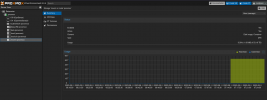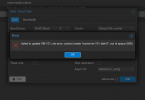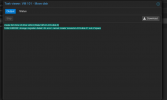Hi everyone,
i am trying to create a RaidZ volume where i would migrate the data from my old server (look this thread : https://forum.proxmox.com/threads/p...ot-sector-no-grub-nothing.131120/#post-577169) and i decided to split my volume as the backup would be much easier to manage in a volume with data that i have to save, RaidZ10, that will be backup on a Proxmox backup server and another volume in RaidZ that i don't care if i lose with purpose of local share for various things, movies, temp files, ...
The RaidZ10 is created well, i can store up to it's capacity, no issue.
If i try to create a VM disk on the RaidZ, i have no success, i am always reported that i am running out of space.
I tried to move the storage from my old server to the new RaidZ and then i would from there do the split of important data that goes to the RaidZ10 and leave what's not important there, using the function "move disk" in the VM of the Proxmox GUI, and i am always reported with out of space as well :
i don't get it.
Thanks for the help.
i am trying to create a RaidZ volume where i would migrate the data from my old server (look this thread : https://forum.proxmox.com/threads/p...ot-sector-no-grub-nothing.131120/#post-577169) and i decided to split my volume as the backup would be much easier to manage in a volume with data that i have to save, RaidZ10, that will be backup on a Proxmox backup server and another volume in RaidZ that i don't care if i lose with purpose of local share for various things, movies, temp files, ...
The RaidZ10 is created well, i can store up to it's capacity, no issue.
If i try to create a VM disk on the RaidZ, i have no success, i am always reported that i am running out of space.
I tried to move the storage from my old server to the new RaidZ and then i would from there do the split of important data that goes to the RaidZ10 and leave what's not important there, using the function "move disk" in the VM of the Proxmox GUI, and i am always reported with out of space as well :
Code:
create full clone of drive virtio1 (Data-VM:vm-101-disk-0)
TASK ERROR: storage migration failed: zfs error: cannot create 'movie/vm-101-disk-0': out of space
Code:
zfs get all
movie type filesystem -
movie creation Fri Aug 11 7:13 2023 -
movie used 1.04M -
movie available 48.4T -
movie referenced 171K -
movie compressratio 1.00x -
movie mounted yes -
movie quota none default
movie reservation none default
movie recordsize 128K default
movie mountpoint /movie default
movie sharenfs off default
movie checksum on default
movie compression off local
movie atime on local
movie devices on default
movie exec on default
movie setuid on default
movie readonly off default
movie zoned off default
movie snapdir hidden default
movie aclmode discard default
movie aclinherit restricted default
movie createtxg 1 -
movie canmount on default
movie xattr on default
movie copies 1 default
movie version 5 -
movie utf8only off -
movie normalization none -
movie casesensitivity sensitive -
movie vscan off default
movie nbmand off default
movie sharesmb off default
movie refquota none default
movie refreservation none default
movie guid 1539010778459645801 -
movie primarycache all default
movie secondarycache all default
movie usedbysnapshots 0B -
movie usedbydataset 171K -
movie usedbychildren 896K -
movie usedbyrefreservation 0B -
movie logbias latency default
movie objsetid 54 -
movie dedup off default
movie mlslabel none default
movie sync disabled local
movie dnodesize legacy default
movie refcompressratio 1.00x -
movie written 171K -
movie logicalused 197K -
movie logicalreferenced 42K -
movie volmode default default
movie filesystem_limit none default
movie snapshot_limit none default
movie filesystem_count none default
movie snapshot_count none default
movie snapdev hidden default
movie acltype off default
movie context none default
movie fscontext none default
movie defcontext none default
movie rootcontext none default
movie relatime off default
movie redundant_metadata all default
movie overlay on default
movie encryption off default
movie keylocation none default
movie keyformat none default
movie pbkdf2iters 0 default
movie special_small_blocks 0 defaulti don't get it.
Thanks for the help.
Attachments
Last edited:




